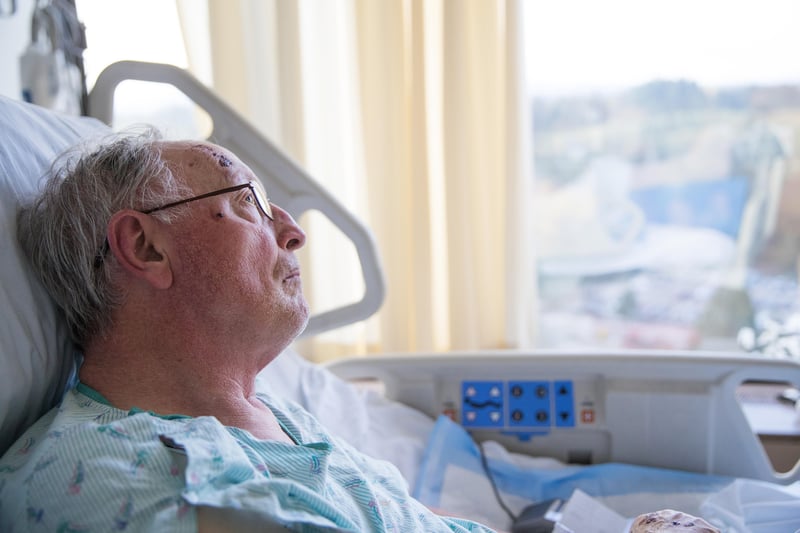Due to a recent change of our website, the process for submitting refill requests online has now changed.
Please click on “Sign Up Today!†to create a new account, and be sure to download our NEW Mobile app!
Thank you for your patience during this transition
Manténgase sano!
Resultados de su búsqueda "Prostate Problems: Management".
Resultados de noticias de salud - 13
MONDAY, Feb. 12, 2024 (Healthday News) -- Defense Secretary Lloyd Austin III, who spent time in intensive care last month for complications related to prostate cancer surgery performed in December, has returned to the hospital with bladder issues, the Pentagon announced Sunday.
"Tonight, after a series of tests and evaluations, the Secretary was admitted into the critical care unit at Wal...
- HealthDay Reporter
- Robin Foster
- |
- February 12, 2024
- |
- Página completa
Defense Secretary Lloyd Austin will not need any more treatment for his prostate cancer and his prognosis is "excellent," his doctors say.
The news came after a follow-up appointment Austin had at Walter Reed National Military Center on Friday.
"Beyond planned physical therapy and regular post-prostatectomy follow-up appointments, he has no planned further treatment for his cancer,"...
- HealthDay Reporter
- Robin Foster
- |
- January 29, 2024
- |
- Página completa
Following two weeks of hospital care for complications from prostate cancer surgery, U.S. Defense Secretary Lloyd Austin has been released from Walter Reed National Military Medical Center, the Pentagon announced Monday.
"Secretary Austin progressed well throughout his stay and his streng...
- HealthDay Reporter
- Robin Foster
- |
- January 16, 2024
- |
- Página completa
When most men think about their prostate, it's to worry about whether they have prostate cancer or not. But another condition is far more common and plenty painful.
Prostatitis involves inflammation of the prostate gland and sometimes the areas around it. Not only is prostatitis highly treatable, but it is highly prevalent among men. According to the Prostate Cancer Foundation, it is the ...
- HealthDay Reporter
- Ann Schreiber
- |
- May 31, 2023
- |
- Página completa
You're due for a prostate exam, but you don't know what to expect.
So, what is this exam like?
Regular check-ups are essential for maintaining your health, and a prostate exam is crucial to preventive care for men. Not only is it a screening test for early signs of prostate cancer, but it also helps detect other potential health issues.
Here, experts walk you ...
- HealthDay Reporter
- Ann Schreiber
- |
- May 31, 2023
- |
- Página completa
Over the last decade, more and more Americans with early-stage prostate cancer have put off radiation and surgery, the standard treatment options, new research indicates.
Instead, many U.S. men with low- or intermediate-risk prostate cancer have embraced "active surveillance,"in which their disease is carefully monitored for any sign of progression that might eventually require inter...
- HealthDay Reporter
- Alan Mozes
- |
- April 4, 2023
- |
- Página completa
An ongoing shortage of a drug for men with advanced prostate cancer is causing some patients to miss months of potentially life-extending treatment.
The drug's maker, Novartis Pharmaceuticals Corp., has said it can't keep up with demand for the medication, known as Pluvicto.
Doctors have had to reschedule some patients who were due to start their first doses of the treatment. Mean...
- HealthDay Reporter
- Cara Murez
- |
- March 21, 2023
- |
- Página completa
Men suffering from an enlarged prostate can receive long-term relief from a minimally invasive procedure that partially blocks blood flow to the gland, new research reports.
The procedure, called prostate artery embolization (PAE), dramatically improved urinary symptoms in patients without having any effect on erectile function, said senior researcher
A new analysis uncovers a racial paradox in prostate cancer care: While Black men are often diagnosed later and with more aggressive disease than white men, radiation therapy seems to work better for them than for their white peers.
To come to that conclusion, researchers reviewed seven trials comprising more than 8,800 men with
Black, Hispanic and Asian men in the United States are less likely than white men to receive a follow-up MRI after a screening suggests prostate cancer, a new study finds.
"We can't say definitively if the reason Black, Hispanic, and Asian men did not receive this particular test is that physicians did not refer them for it, or if the patients opted themselves out of further testing," sai...
- HealthDay Reporter
- Robert Preidt
- |
- November 10, 2021
- |
- Página completa
A urine test might one day be able to tell which prostate cancer patients need immediate treatment and which don't, British researchers report.
"Prostate cancer can be divided into low and high risk -- the low-risk men rarely require treatment, and the high-risk certainly do," said study author Jeremy Clark, a senior research associate at Norwich Medical School at the University of E...
- HealthDay Reporter
- Steven Reinberg
- |
- November 4, 2021
- |
- Página completa
After prostate cancer surgery, men can safely undergo fewer radiation treatments at higher doses, a new clinical trial shows.
Researchers found that the shorter regimen -- given over five weeks, instead of seven -- did not raise patients' odds of lasting side effects.
Safety has been a "major concern" because when patients have fewer radiation treatments, the daily dose needs to be ...
- HealthDay Reporter
- Amy Norton
- |
- October 27, 2021
- |
- Página completa
Does having an enlarged prostate doom you to prostate cancer?
Far from it, a new study suggests.
Also called benign prostatic hyperplasia (BPH), the condition may actually provide some protection for men from developing prostate cancer, researchers report.
"Men are often anxious about prostate cancer, as it is the second most common cancer in men, with some worrying BPH increa...
- HealthDay Reporter
- Steven Reinberg
- |
- August 25, 2021
- |
- Página completa










